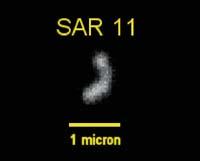Bacteria that use light to survive

The most abundant bacteria in the oceans have a gene that allows them to absorb sunlight, allowing them to grow independently of carbon absorption. This allows them to survive in marine areas with little food.
In the last five years, two investigations have been conducted to investigate this type of bacteria. Both studies have highlighted the importance of photoproteodoxin. This protein has been found in the bacteria SAR86 and the microbe SAR11. Proteorodoxin uses solar energy to expel ions from the cell, while the resulting ion gradient attracts protons into the cell. As a result of this process, the cell gets energy to grow. Tests performed with the microbe SAR11 have shown that cells grown in light and dark media contain the protein gene. In addition, protein is only activated when necessary, as there are no significant differences between cells grown in these media.
One in four ocean cells is SAR11. Therefore, the hope of finding photoproteins in more marine cells has increased. At the same time, the possible importance that this discovery may have in the future has been expanded.





